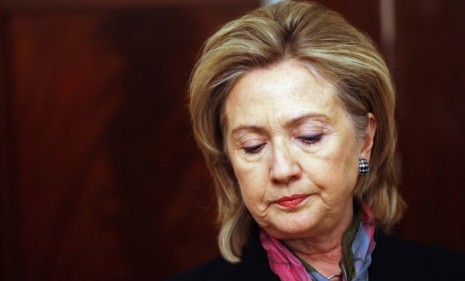WikiLeaks' 'Cablegate': 5 possible repercussions
Could Julian Assange's latest data dump force Hillary Clinton to resign — or even spark World War III?

A free daily email with the biggest news stories of the day – and the best features from TheWeek.com
You are now subscribed
Your newsletter sign-up was successful
It's day two of "cablegate," and fierce debate continues to rage over WikiLeaks' unveiling of thousands of diplomatic cables from U.S. embassies to the government. Beyond diplomatic embarrassment, what will the fallout be? Here, five possible outcomes commentators have floated:
1. Obama shuts down WikiLeaks
The White House has already made it clear it wants to take legal action against WikiLeaks. But the government could seize the WikiLeaks domain without the need for a trial, says Mike Maznick at TechDirt, simply by exercising its Homeland Security powers. That could, however, be seen as government censorship. "The backlash to such a move would be overwhelming."
The Week
Escape your echo chamber. Get the facts behind the news, plus analysis from multiple perspectives.

Sign up for The Week's Free Newsletters
From our morning news briefing to a weekly Good News Newsletter, get the best of The Week delivered directly to your inbox.
From our morning news briefing to a weekly Good News Newsletter, get the best of The Week delivered directly to your inbox.
2. Julian Assange is jailed, or even executed
WikiLeaks' idiosyncratic Australian founder is the target of most critics' ire over "cablegate" and some warn he could soon be headed for jail — or worse. If the courts decide Assange leaked this information to deliberately cause harm to the U.S, he could be tried on espionage charges. The U.S. has demanded his passport be cancelled, and he is on Interpol's most wanted list for allegations of rape in Sweden. Conservatives including Bill O'Reilly and Sarah Palin have called for him to be hunted down or executed. It's not all bad for the Australian, though: Ecuador has offered him asylum.
3. Hillary Clinton resigns
The Secretary of State is under fire after diplomatic cables suggested she had instructed U.S. officials to "spy" on the heads of the U.N. and diplomats from other nations. The controversy makes her position untenable, argues Jack Shafer at Slate. No one will trust a State Department it thinks is spying on them, and Clinton will pay the price. "Diplomacy is about face, and the only way for other nations to save face will be to give them Clinton's scalp." Fortunately for Clinton, the scandal may be overshadowed by WikiLeaks' other revelations, says David Corn at Politics Daily. "Given the ADD of the national media, she probably can survive the storm."
A free daily email with the biggest news stories of the day – and the best features from TheWeek.com
4. The U.S. wages war on Iran
"The leak makes military conflict between Iran and the United States more likely," says David Frum at CNN. Arab nations' concerns about Iran's behavior are now out in the open, as is evidence of Iran's "contemptuous rejection of all diplomatic approaches." It's not yet inevitable, but regime change is "more politically feasible" now than ever before. Alternatively, says Reza Marashi at The Huffington Post, Iran's "new-found sense of isolation" could prompt it to "cut a deal" with the U.S. If Iranian officials decide that the damage to both countries from WikiLeaks has "leveled the playing field," it would make it easier to "reach an agreement without losing face."
5. World War III begins
"Cablegate's" key victim, says David Gewirtz at ZDNet, is "trust," both between nations and between diplomats. "If you think about it, trust can be all that stands between us and terrible circumstance, whether that’s the breakup of a family or total, nuclear Armageddon." Julian Assange could well be an Archduke Franz Ferdinand for our times, says Stephen Blackwell at Death and Taxes. His actions have turned Iran and the leaders of the Muslim world against each other. In World War I, "alliances were called to action and war set into motion." The same thing could happen again.